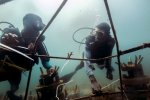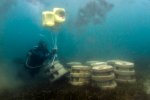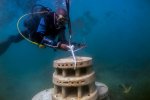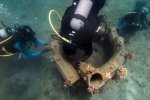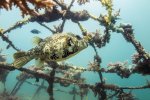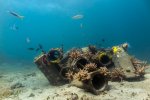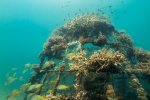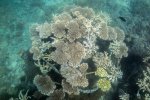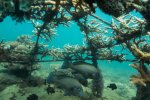
category_news
The search for a sustainable future for the coral reefs in Kenya
In southeast Kenya, near the border with Tanzania, lies a coral reef in the Indian ocean. The coral reef has degraded due to unsustainable fishing and climate change. WUR PhD student Joshua Wambugu is investigating how the local community and other stakeholders can contribute to restoring the reef and finding a sustainable livelihood.
Wambugu works in two chair groups of Wageningen University, the Marine Animal Ecology group and the Environmental Policy group, because there are both environmental and societal issues at stake. He is also a Research Associate with CORDIO East Africa, a non-profit research organisation in Mombasa focusing on coral reef ecosystems and community-based marine conservation. ‘I have a background in tourism and nature conservation, and those are key issues in the local community’, says Wambugu. ‘The coral reef attracts around 300 tourists a day to the Kisite Marine Park, but the local economy also depends on fisheries.’
The key question is: what do we – people – need to do?
Lack of modern knowledge
The local community has traditional knowledge of how to care for nature, says Wambugu, but the coastal people don’t have a lot of emerging modern knowledge about nature conservation, especially when it comes to the artificial reef structures that the government and NGOs are building to restore the reefs. Another issue is that part of the coral reefs are situated in Community-Managed Areas, where the subsistence fishers cannot cast out their nets but are forced to rely on traditional fishing types, with harpoons, hand fishing lines and basket traps.
Joshua Wambugu - Social aspects of koral reefs in Kenya:
- Unfortunately, your cookie settings do not allow videos to be displayed. - check your settings
New opportunities
Wambugu is studying how artificial reef restoration, sustainable fisheries and tourism practices contribute to the ecosystem. He also examined how the different stakeholders – local beach management units, tourist agencies, the government, construction companies, NGOs and funding agencies – are involved in the process. Moreover, he studies whether the livelihoods of the locals are improving. ‘The majority of the people depend on fishing and tourism, so they also need other sources of income, like aquaculture and seaweed farming. We can help them find these new opportunities.’
He admits that the future is still problematic, since the corals are bleaching due to climate change, and the locals cannot change that. However, if they manage to restore the reefs, the reefs will recover, bringing back fishing zones with spillover effects and tourist diving sites.
His drive is to find answers together and to improve coral reef conservation while empowering the local community. ‘If we want blue transitions, the key question is: what do we – people – need to do?’
Coral growth in 2 years on an aritfic reef of concrete structures





